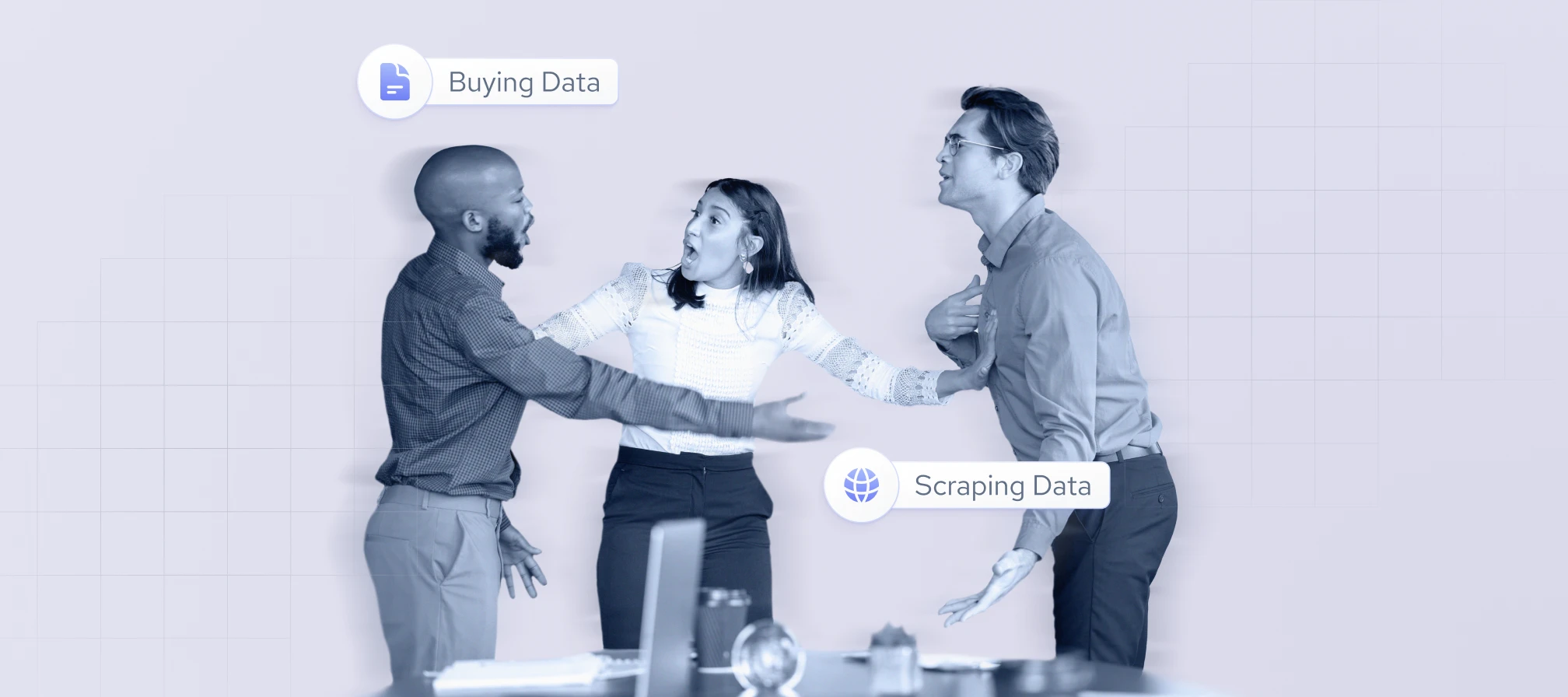A data marketplace is a virtual platform where users interact to sell and buy datasets. In general, these platforms are based on cloud services where both businesses and individuals can upload data from multiple sources. These platforms follow strict privacy regulations, providing a safe environment for both parties, along with quality and consistency. Thus, a data marketplace is where multiple data providers upload information while data buyers search for and purchase data that meet their requirements and needs.
What is data monetization?
Data marketplace is tightly connected to the concept of data monetization. On certain data platforms, data providers, such as companies, can upload data assets and enrich their income streams. For instance, McKinsey & Co. has a data monetization strategy. A data monetization initiative has several steps. Data providers first need to identify the value, type, target clients, and what insights their data can provide to other companies. From there, data providers must choose the right data monetization platform, as there are a variety of platforms that cater to different industries.
Data marketplaces versus data lakes
Data lakes or data warehouses refer to in-house solutions established by businesses to manage and analyze data. These are used to process the data inside the corporation. On the other hand, data available in data marketplaces are external and, as a result, much broader. Unlike internal data warehouses, a data marketplace allows businesses to access any type of external data. Further, internal data lakes often contain vast amounts of unstructured data. Additionally, sometimes internal data warehouses are difficult to use due to a lack of metadata and other data fields such as customer behavior, geolocation, and financial data.
Additionally, the benefit of a data marketplace over the on-premise solutions is that the datasets are often ready-to-use and convenient for businesses. Information obtained from a marketplace is already processed, so you can spend your time gaining strategic insights rather than processing data. For example, API data solutions provide companies with near-instant data that can be integrated into a variety of analysis tools or analyzed by data scientists.

Types of data marketplaces
B2B data marketplaces
B2B data marketplaces allow businesses to trade internal information. This is the most common type of data marketplace as organizations are most interested in data sharing. Companies monetize data assets and provide data buyers with analytics-grade, powerful datasets. These give an insight into competitors, clients, market trends, and more.
If you're looking for B2B data, you don't have to look anymore. Always fresh and accurate B2B data is Coresignal's specialty.
IoT data marketplaces
IoT data marketplaces are platforms where users can buy and sell intelligence created by the Internet of Things. All of this information comes only from interconnected devices, databases created to streamline the information produced globally. When structured, these datasets provide potent insights into online trends, consumer behavior, and technology.
Personal data marketplaces
Many media scandals focused on how big tech companies sold their users’ personal data for their own commercial benefit. Individuals now use personal data marketplaces to share their own data, such as location, online behavior, and other consent-based information, while receiving financial incentives. This is the main driving force behind data for good, a recent movement that aims to use data and analytics to improve human well-being, respond to emergencies via location mapping, and more.
Why is data marketplace important?
Data marketplace connects data sellers with data buyers. Data is often optimized, cleaned, and structured so external businesses can use it with ease. Data sharing via these platforms is safe, often based on blockchain technology.
The IoT and web-scraping helped more than 2.5 quintillion bytes of data to be created every day. In fact, it is expected that global data creation will reach 180 zettabytes by 2025. This enormous creation of global data is what underpins the importance of data marketplaces.
Firstly, data marketplaces are important because they encourage individuals and businesses to generate income by selling the internal data they generate via regular processes and internal systems. Mass adoption of technology and user-generated content has led to a massive digital footprint when it comes to publicly available data. As a result, data marketplaces connect this data with the right data buyers, allowing them to purchase external data with ease for enhanced data-driven decision-making.
Additionally, these marketplaces provide a stable, straightforward method of navigating this entire data world. This is because such platforms are built with user-friendliness in mind, so both individuals and businesses can harness the power of data, not only analysts or data scientists. Data marketplaces often resemble regular e-commerce platforms, so users enjoy a familiar experience – however, instead of purchasing products, they buy datasets, similar to any other product sold online. Most of these datasets are already curated and structured, ready to be used instantly by anyone.
Lastly, the data market brings benefits to both buyers and sellers. These platforms do not own the data; rather, they facilitate the data exchange, allowing for a low-cost, transparent method of exchanging data between the interested parties.

How do data marketplaces work?
Finding the right data providers
When organizations want to enrich their processes with valuable data, it is important that they thoroughly research potential data providers in order to find the right third-party data provider for them. The main benefit of a data marketplace is that it has multiple data providers, increasing the chances of finding the right data source. Also, users on these platforms can be physically located anywhere in the world, so any business can connect with the right data provider, which might not be possible otherwise.
For instance, data platforms allow you to browse, scrape and filter data according to numerous parameters. Similar to filtering accommodation on Booking.com or looking for a specific product on Amazon, businesses use data marketplaces to find a particular type of data according to their budget, geographical location, and other criteria.
Compare your possibilities
Finding a trustworthy data provider can be challenging. Unlike other data sourcing methods, a data market allows businesses to easily compare data providers because these platforms are independent intermediaries between sellers and buyers.
The ability to easily compare different data sellers increases your chances of finding the right datasets. This unbiased way of sourcing data is not only transparent, but you may also access data sourcing advice. Many platforms provide consultancy services, so you can tap into a pool of information to find the perfect match for your requirements.
Access to external data samples
Buying external data, also known as third-party data, can be extremely costly as it provides an unmatched competitive advantage. Fortunately, many data marketplaces allow organizations to try a sample of the chosen data before paying for the entire set. This helps you ensure that the data you chose is suitable for your needs, so you can use it to make data-driven decisions.
Also, in some cases, businesses need to ensure that the third-party external data they purchase is compatible with their corporation’s software capabilities. A data sample allows you to run a test and make sure the data is suitable before purchasing third-party data.
Purchase your data
After you try the right data sample, you can purchase it. In general, these sets will be available in different formats, depending on the data provider. For instance, some might provide bulk databases via S3 drops, APIs, or continuous data feeds. In general, the platform will charge a commission for connecting you with the right seller. Depending on your chosen data marketplace, the cost structure might differ:
- On-going data subscription where you have access to continuous data streams.
- Usage-based agreements where you pay only for the data you use and when you use it. Sometimes, there might be a minimum monthly fee.
- One-off data purchase occurs when you buy one or more datasets at a fixed price, but there will not be any guaranteed updates to your data.
Review Your Experience
One of the main reasons why the data industry is currently intransparent is the fact that there is a lack of post-purchase feedback provided by actual buyers. Data marketplaces often invite buyers to leave feedback after purchasing the data. This allows you and other buyers to choose only trusted, high-quality data sources.
Data marketplaces allow you to check which data providers are the top ones, the availability of customer service, and the quality of the overall experience. This ability to review your experience turns data shopping into a productive experience, shaping the entire data community for the better. Authentic buyers’ reviews enhance transparency and encourage data providers to improve the quality of their services.

How do companies benefit from data marketplaces?
The value of data for businesses is increasing every day. The growth of big data has become increasingly evident as business professionals’ implementation of data-driven decision-making is expanding to survive and grow in today’s highly competitive digital landscape. Consequently, a data marketplace provides an excellent solution for businesses and investors looking to stay ahead of their competition.
According to Pitney Bowes, businesses are quickly increasing their spending on data marketplaces. For instance, 54% stated that they aim to spend more, while 37% of companies were willing to exceed $10,000 worth of data. Overall, 99% of businesses want to purchase data via a data marketplace.
Numerous reasons reinforce this decision. Adding external data to internal databases allows corporations to make data-driven decisions with enhanced accuracy and confidence. Some additional benefits include:
- Improve predictive models
- Increase ROI
- Enhance productivity
- Improve risk management
- Ability to win new customers
- Improve business processes (i.e., increase throughput, reduce cycle time)
- Opportunity to become an industry disruptor
When it comes to data selling, there is a new set of benefits for companies: data monetization. Because data marketplaces allow for data monetization, which turns information into a secure source of extra income, companies that create massive amounts of data as a by-product of standard business processes now have the opportunity to sell them to interested parties. Furthermore, firms from all industries are starting to realize the tremendous value and demand for their internal data, so data marketplaces allow these businesses to take advantage of these new opportunities.
Summary
It is likely that your business already uses external data collected from different places, such as social media platforms. Right now, most businesses use in-house solutions to make data-driven decisions. However, this is about to change as data marketplaces evolve and turn fresh data into an opportunity for you to take action.




